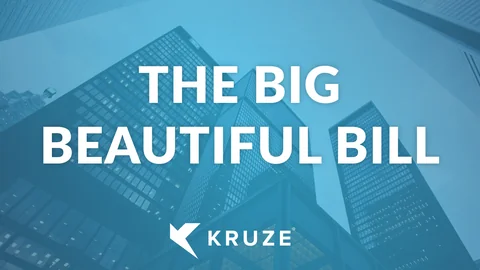
The recently enacted One Big Beautiful Bill Act (OBBBA) brings sweeping changes to the U.S. tax landscape, with significant implications for venture-funded startups. As a Kruze Consulting client – or any founder in the startup ecosystem – understanding these changes is important for tax planning, fundraising, and long-term growth.
Key Tax Changes Impacting Startups
R&D Tax Credits and Expensing
-
Immediate expensing of domestic R&E expenditures. For tax years beginning after December 31, 2024, taxpayers will be able to immediately deduct all domestic (US) research and experimentation (R&E) expenditures in the year they are paid or incurred. This restores the pre-2022 treatment and eliminates the current requirement to capitalize and amortize these costs over five years.
There is also an option to elect to capitalize and amortize domestic R&E expenditures over a period of at least 60 months, starting with the month in which benefits are first realized.
- Foreign R&E expenditures. Foreign R&E expenditures will continue to be subject to mandatory capitalization and 15-year amortization.
-
Transition and retroactive relief for small businesses. All taxpayers are allowed to deduct any remaining unamortized domestic R&E expenditures (incurred in tax years beginning after December 31, 2021, and before January 1, 2025) either in the first tax year beginning after December 31, 2024 (tax year 2025), or ratably over two years (tax years 2025 & 2026).
Eligible small businesses (those meeting the Section 448(c) gross receipts test) may also have the opportunity to apply the new expensing rules retroactively to amounts paid or incurred in tax years beginning after December 31, 2021. This allows for amending prior returns to claim immediate deductions for domestic R&E expenditures previously capitalized. This option is only beneficial if the company was in a taxable income position in tax years 2022, 2023, and/or 2024.
- Effective date. These changes will apply to amounts paid or incurred in tax years beginning after December 31, 2024. The retroactive election for small businesses applies to amounts paid or incurred in tax years beginning after December 31, 2021.
These changes are major wins for pre-revenue startups investing heavily in product development.
Qualified Small Business Stock (QSBS) Improvements
- QSBS asset limit raised. The corporate asset ceiling for Section 1202 QSBS eligibility increases from $50 million to $75 million, indexed for inflation starting in 2027. Startups can now raise more capital and grow larger before losing QSBS eligibility, which extends the window for issuing QSBS to new investors and employees.
- Exclusion cap increased. The per-issuer gain exclusion cap rises from $10 million to $15 million (or 10x the shareholder’s basis, if greater), making QSBS even more attractive for founders and early investors, since a larger amount of gain can be excluded from federal taxes when selling QSBS. The $15 million cap will be adjusted for inflation beginning in 2027.
-
Shorter holding periods. The bill introduces tiered gain exclusions and potentially shorter holding requirements for new QSBS issuances. Under the previous rule, 100% of the gain exclusion required a five-year holding period.
Under the new tiered system, QSBS acquired after July 4, 2025 will have the following holding periods:
Three years: 50% gain exclusionFour years: 75% gain exclusion
Five years: 100% gain exclusion
These changes make equity in startups more valuable and attractive to both founders and venture investors.
Bonus Depreciation and Section 179 Expensing
- 100% bonus depreciation restored. Businesses can again immediately deduct the full cost of qualified property (including machinery, equipment, and certain real estate improvements) placed in service after January 19, 2025, through 2030.
- Section 179 cap raised. The maximum amount startups can expense for qualifying equipment and software purchases is increased from $1 million to $2.5 million, with the phase-out threshold increased to $4 million. Both amounts are indexed for inflation starting in 2026. This allows startups to immediately deduct the full cost of qualifying equipment, software, and certain improvements to nonresidential real property, rather than depreciating them over several years.
These provisions make it easier for startups to invest in technology, lab equipment, and office improvements without waiting years to recover costs through depreciation.
What Should Startup Founders Do Now?
- Revisit your tax strategy. With permanent and expanded deductions, it’s time to update your tax planning models and forecasts.
- Maximize R&D and equipment expensing. Accelerate investments in technology and product development to take full advantage of immediate expensing and enhanced credits.
- Evaluate QSBS opportunities. Review your company’s eligibility for QSBS and structure new equity issuances to maximize tax-free gains for founders and investors.
How Kruze Consulting Can Help
At Kruze Consulting, we specialize in helping venture-funded startups navigate complex tax changes. Our team can:
- Analyze your eligibility for new and expanded deductions and credits
- Optimize your R&D tax credit claims
- Provide strategic guidance on tax-efficient fundraising and exit planning
Contact us to make sure you’re maximizing the benefits of the OBBBA and positioning your startup for success in this new tax environment.








